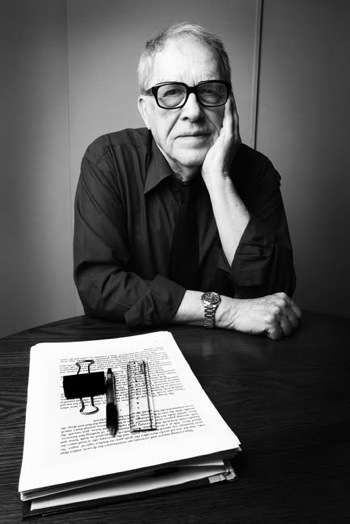
I remember that the New York Times Magazine once commissioned me to do a profile on Kurosawa. I did not one but three, each one different though similar, and each one was rejected because my subject was "not in focus," because the "idea" of Kurosawa did not emerge clearly enough, because I could not capture his essence in ten pages. Most of this inability was due to my lack of skill, but some of it was because Kurosawa is an extra-ordinarily complicated person. Generalizations fit him no more than they do his films. The only way to understand Kurosawa is to understand his pictures.
And to understand Kurosawa is to read Donald Richie, the author of the above passage who passed away Tuesday at the age of eighty-eight.
When the Lima, Ohio-born Richie arrived in Tokyo in 1947 with the Allied Occupation forces, he began a lifelong love affair with Japanese culture that would lead to an intense fascination with the country's film industry. He struck up friendships with Akira Kurosawa and Yasujiro Ozu as both men were entering their creative prime, and went on to write what many consider the definitive English-language criticism of their work.
In 1959, Richie and Joseph Anderson published THE JAPANESE FILM: ART AND INDUSTRY, the first English-language examination of the nation's thriving cinema. Though Richie's interests were not strictly cinematic (he also wrote novels, histories, and memoirs relating his experiences as an expat living in Japan), he returned repeatedly to the films of Kurosawa, each time refining his analysis of the director's recurring themes. There's a reason why The Criterion Collection rarely releases a Kurosawa film without a Richie essay or commentary: to date, no one has deconstructed the master's films more authoritatively or eloquently. Whenever I finish a review of a Kurosawa movie, I immediately consult my well-worn copy of Richie's THE FILMS OF AKIRA KUROSAWA in order to essentially check my math. While my personal opinion of a particular film may differ, Richie's analysis of Kurosawa's movies is almost always definitive.
In the introduction of Richie's A HUNDRED YEARS OF JAPANESE FILM, Paul Schrader wrote "Whatever we in the West know about Japanese film, and how we know it, we most likely owe to Donald Richie." What an amazing legacy.
For a full obituary on Richie's life, check out this piece in the New York Times. I'll leave you with my favorite Richie quote on the overriding theme of Kurosawa's films: "Man must fight to retain hope in the midst of this hopeless world, and in this fight all men are brothers."
